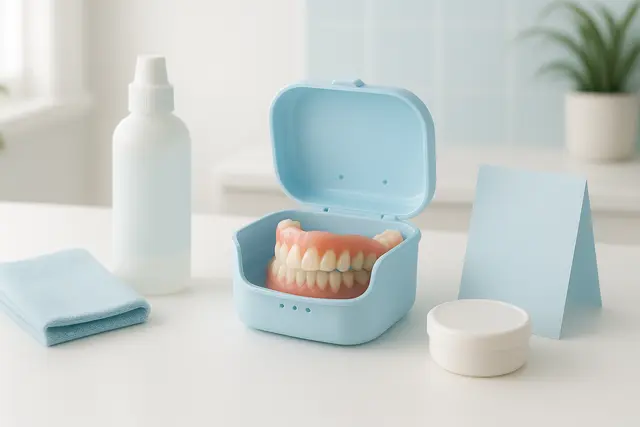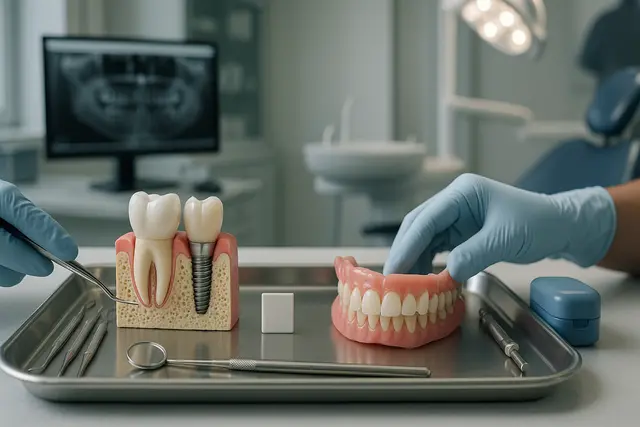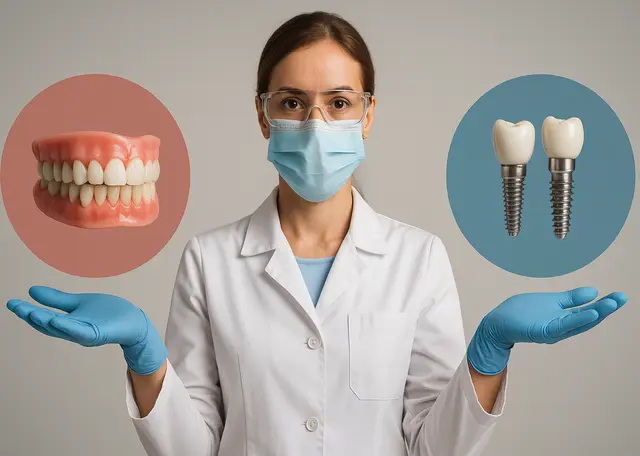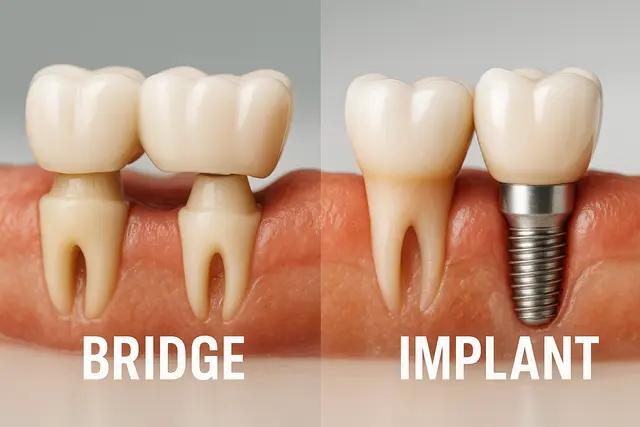Prosthodontics
4 min read
Jul 10, 2025
How to Clean Temporary Dentures: A Simple Step-by-Step Guide
Wearing temporary dentures comes with a learning curve, and keeping them clean is one of the most important parts. Without the right care, they can quickly become uncomfortable, stained, or even harmful to your oral health. Luckily, maintaining them doesn’t have to be complicated or time-consuming.

Getting used to wearing a new denture can feel like adjusting to a new pair of shoes. Except these are in your mouth. And like anything that lives in your mouth all day, temporary dentures need proper care to stay fresh, comfortable, and stain-free. If you’re new to this or just want to make sure you’re doing it right, don’t worry. We’ve broken it all down into simple, doable steps.
What Is a Temporary Denture?
A temporary denture, sometimes called an interim denture or immediate denture, is a dental appliance designed to help you talk, chew, and smile while your gums heal after extractions or other treatments. It can be a full or partial denture, depending on how many teeth you’re replacing. These removable placeholders are made of acrylic and are more delicate than permanent dentures, so they need extra TLC.
How To Clean Your Temporary Dentures
No matter which type you wear, your denture collects plaque, food particles, and bacteria just like natural teeth do. Ignoring your denture care routine can lead to foul smells, gum irritation, and even denture stomatitis, a type of infection. Plus, dirty dentures can look, well, gross.
To keep your dentures and mouth happy, it’s important to clean them daily. Doing so not only improves oral hygiene but also helps your dentures last longer.
Step 1: Remove and Rinse Dentures After Eating
Start by removing your removable denture after meals. Hold it over a soft towel or a sink filled with water, just in case you drop it. Then rinse dentures thoroughly to wash away loose particles and food debris. Avoid using hot water; it can weaken dentures and change their shape.
Step 2: Brush with a Soft Touch
Once you’ve rinsed, give your denture a gentle scrub with a denture brush or soft-bristled toothbrush. Either tool works, just avoid anything abrasive. If you use toothpaste, make sure it’s a type of toothpaste that’s non-whitening and free of harsh ingredients. Whitening toothpaste might scratch the denture material and actually make it look dull over time.
Don’t forget to brush your gum tissue, the roof of your mouth, tongue, and any natural teeth while you’re at it. A clean mouth helps your denture cleaner stay clean too.
Step 3: Soak in a Denture Cleaner or Solution
After brushing, it’s time for a good soak. Use a denture soaking solution; never bleach or household cleaners. Those may loosen fittings or cause permanent damage. Drop a tablet in warm (not hot!) water and let the denture soak according to the product instructions.
Want to go high-tech? You can also use an ultrasonic denture cleaning unit. It uses sound waves to shake off deposit buildup in hard-to-reach places. Either way, soaking helps whiten, disinfect, and extend the life of your denture.
Step 4: Rinse Again Before Wearing
This step is small but mighty. Always rinse your denture well after soaking, especially if you used a chemical cleanser. Leftover solution can cause sore spots or irritation on your gum tissue. A quick rinse with cool water does the trick.
Step 5: Store Properly When Not in Use
If you’re not wearing your dentures overnight, keep them moist in a safe container filled with water or a proper cleaning solution. This helps prevent warping. Never let them dry out or leave them unprotected on the counter. Your pet (or your toddler) will thank you.
Tips for Extra Denture Cleanliness
Let’s talk about upgrades:
You can find denture adhesive options that don’t leave sticky residue.
There’s also denture cleanser foam for quick touch-ups.
Even peroxide-based soaks help remove stubborn stains.
But avoid anything with bleach, strong acids, or abrasive grains. These don’t just weaken the surface; they can alter how your dentures fit.
If you're wondering whether you can use your old toothbrush on your denture, go ahead; just make sure it’s a soft toothbrush or a brush labeled for denture care. And please, don’t share brushes.
Healthier Gums and Longer Lasting Dentures
Good denture care isn’t just about vanity (though that sparkling smile is a nice bonus). It’s about your oral health. Bacteria from an unclean dental appliance can spread to your gum and even lead to gum disease.
Keep your dentures clean, and your mouth stays fresher, your gum tissue stays healthier, and your dentures last longer. Think of it like washing your face before bed, easy to skip, but you always regret it when you do.
See Your Dentist If Something Feels Off
A new denture can feel snug at first, but if you’re noticing ongoing discomfort, irritation, or changes in fit, it’s time to schedule an appointment. Dentures can cause issues when they’re worn, cracked, or misaligned.
Keep up with regular dental check-ups even if you no longer have all your natural teeth. A dentist can check for sore spots, make adjustments, and ensure everything is functioning the way it should.
Dentures Need More Than a Quick Rinse
Your dentures require attention, patience, and a bit of routine. Just like you wouldn’t wash your dishes with one splash of water, you shouldn’t treat your denture to a rinse-and-go lifestyle.
With this simple guide and a few trusted tools, a denture cleaner, a soft-bristled brush, a proper cleanser, and a touch of daily habit, you’re setting yourself up for success. It’s not just about how your denture looks. It’s about how it feels, how it helps you eat and speak, and how it supports your overall hygiene.
So grab that soft towel, use a soft-bristled toothbrush, and give your denture the same love you’d give your smile because, honestly, they’re one and the same.
What Is a Temporary Denture and Why Is It Used?
A temporary denture is a removable dental appliance worn right after tooth extractions. It helps restore your ability to talk, eat, and smile while your gums heal. Made of acrylic, it's designed for short-term use until your permanent denture is ready.
How Do You Properly Clean a Temporary Denture?
Clean your temporary denture daily by rinsing after meals, brushing gently with a soft-bristled brush, and soaking it in a denture-cleaning solution. Always rinse again before wearing it to remove any residue from the cleanser and avoid irritation.
Can I Use Toothpaste or Household Cleaners on My Denture?
No, avoid using whitening toothpaste, bleach, or abrasive cleaners. These can scratch the denture surface or damage the fit. Use a mild denture cleanser and a soft brush specifically made for denture care to keep it safe and clean.
What Should I Do If My Denture Feels Uncomfortable?
If your temporary denture feels loose, causes sore spots, or doesn't fit right, contact your dentist. These issues may require an adjustment, especially as your gums change during healing. Regular check-ups ensure your denture continues to fit comfortably.Ask ChatGPT
Read Next
Related Posts

Prosthodontics
Implant vs. Dentures Pros and Cons: A Deep Dive into Modern Solutions
Missing teeth can impact more than just your smile, they can affect how you eat, speak, and feel about yourself. Fortunately, modern dentistry offers two leading solutions to bring back both function and confidence: dentures and dental implants. Understanding the pros and cons of each can help you make the choice that fits your needs, lifestyle, and budget.
7 min read
Oct 17, 2025

Prosthodontics
Full Mouth Implants vs. Dentures: Which Is Better for You?
When it comes to replacing missing teeth, the choice between full mouth dental implants and dentures can be overwhelming. Each option has its own set of benefits, limitations, and long-term considerations, making it essential to understand what works best for your needs, health, and lifestyle.
5 min read
Oct 17, 2025

Prosthodontics
Tooth-Supported Bridge vs. Implant Comparison: Benefits, Drawbacks, and Insights
Deciding between a dental bridge and a dental implant can feel overwhelming, especially when both options promise to restore your smile and improve oral function. Each solution comes with its own set of benefits, considerations, and ideal use cases, making it essential to understand how they compare before choosing what’s right for you.
6 min read
Oct 17, 2025
Don’t have time to research every dentist around you?
See why 30k+ patients trusted us